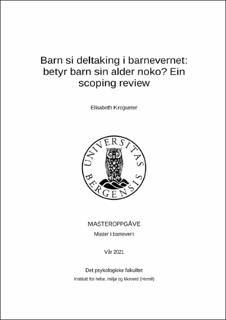Barn si deltaking i barnevernet: betyr barn sin alder noko? Ein scoping review
Master thesis
Permanent lenke
https://hdl.handle.net/11250/2759418Utgivelsesdato
2021-05-20Metadata
Vis full innførselSamlinger
- Master theses [162]
Sammendrag
Bakgrunn: Yngre barn vert i dag involvert i liten grad i eiga barnevernssak. Argumenta for dette er blant anna at barn er i behov for beskyttelse, samt at dei i liten grad bidreg med informasjon. Til tross for stort fokus på barn si deltaking i barnevernet i forsking, litteratur og teori, er det utfordringar med å praktisere barn si deltaking. Formål: Denne studien vart utvikla for å identifisere kva som er kjent gjennom empirisk forsking i høve barn si deltaking i barnevernet og om alder har innflytelse på dette. Metode: Metoden som er nytta i denne studien er ein scoping review. Mitt empiriske datamateriale kjem frå databasane Web Of Sciense, PsycINFO og Idunn. Søkestrategien bestod av to søkefilter som utgjer kjernen i forskingsspørsmålet: «child protection» og «child participation». For val av studiar som inngår i analysen vart det nytta inklusjons- og ekskulsjonskriteriar. Studiar som vart inkludert var vitskaplege fagfellevurderte artiklar skreve på norsk eller engelsk, publisert i perioden 2005-2020 og fokuserte på barn og unge (0-23 år) si deltaking i barnevernet. Resultat: Totalt vart det identifisert 595 artiklar, av desse var det 16 empiriske artiklar som oppfylte inklusjonskriteria og såleis lagde datamaterialet for studien. Hovudtemaene som vart teke opp var; barnet sin alder og modenheit, kontaktpersonen sin kompetanse i høve sikring av yngre barn si deltaking, kontaktpersonen sitt syn på barn og deltaking, annerkjenning av barn sitt perspektiv, barn sitt behov for beskyttelse vs deltaking grunna alder og manglande modenheit, barn sitt syn og oppleving av deltaking, og barn som kompetente aktørar. Relevans: Funn frå studien indikerer at det framleis er utfordringar med å innfri barn sine rettar til deltaking, og då særleg dei minste barna. Manglande kompetanse hjå kontaktpersonar er ei utfordring for å sikre dei yngste barna deltaking i eiga barnevernssak. Framtidig forsking bør fokusere på dei yngste barna si deltaking, og utforske ulike metodar som kan nyttast for å sikre dette. Background: Younger children today are involved to a small extent in their own child welfare case. The arguments for this are, among other things, that children are in need of protection, and that they don’t contribute with sufficient information. Despite the strong focus on children's participation in child welfare in research, literature and theory, there still are challenges in practicing children's participation. Purpose: This study was developed to identify what is known through empirical research concerning children's participation in child welfare and whether age has an influence on participation. Method: The method that is used in this study is a scoping review. Web Of Sciense, PsycINFO and Idunn were used as a database. The search strategy consisted of two search filters that form the core of the research question: "child protection" and "child participation". For the selection of studies included in the analysis, inclusion and exclusion criteria were used. Studies that were included were scientific peer-reviewed articles written in Norwegian or English, published in the period 2005-2020 and focused on children and young people’s (0-23 years) participation in child welfare. Result: A total of 595 articles were identified, of which 16 were empirical articles that met the inclusion criteria and thus created the data material for the study. The main topics addressed is; the child's age and maturity, the social worker's competence in ensuring younger children's participation, the social worker's view of children and participation, recognition of children's perspective, children's need for protection vs participation because of age and lack of maturity, children's view and experience of participation, and children as competent actors. Relevance: Findings from the study indicate that there are still challenges in fulfilling children's rights to participate, and especially the youngest children. Lack of competence among social workers is a challenge to ensure that the youngest children participate in their own child welfare case. Future research should focus on the youngest children's participation, and explore different methods that can be used to ensure this.
